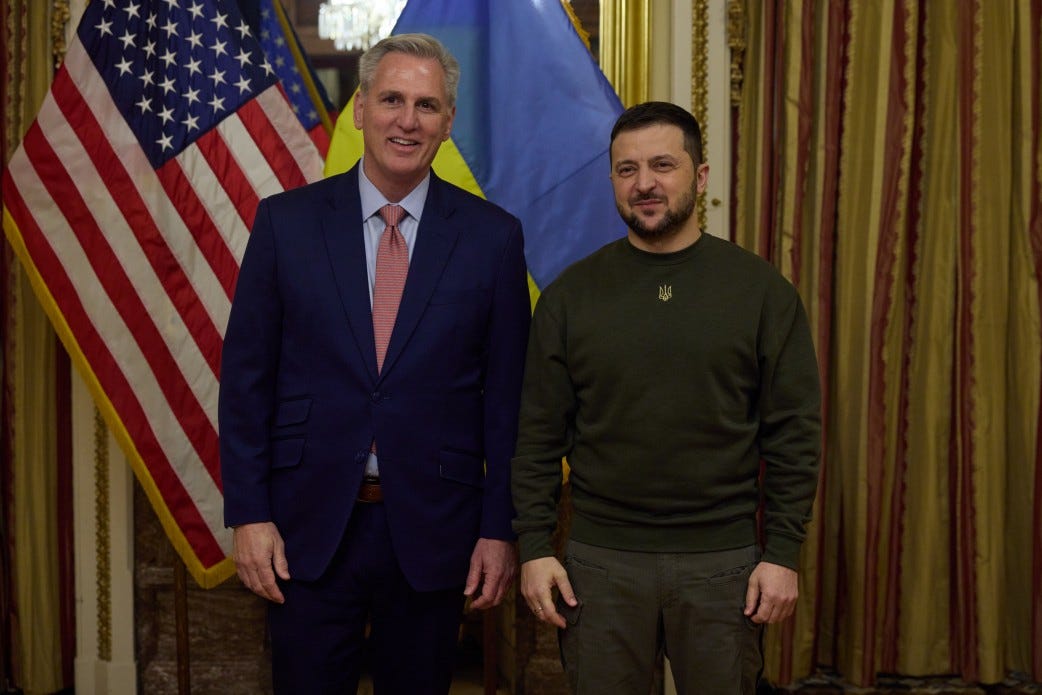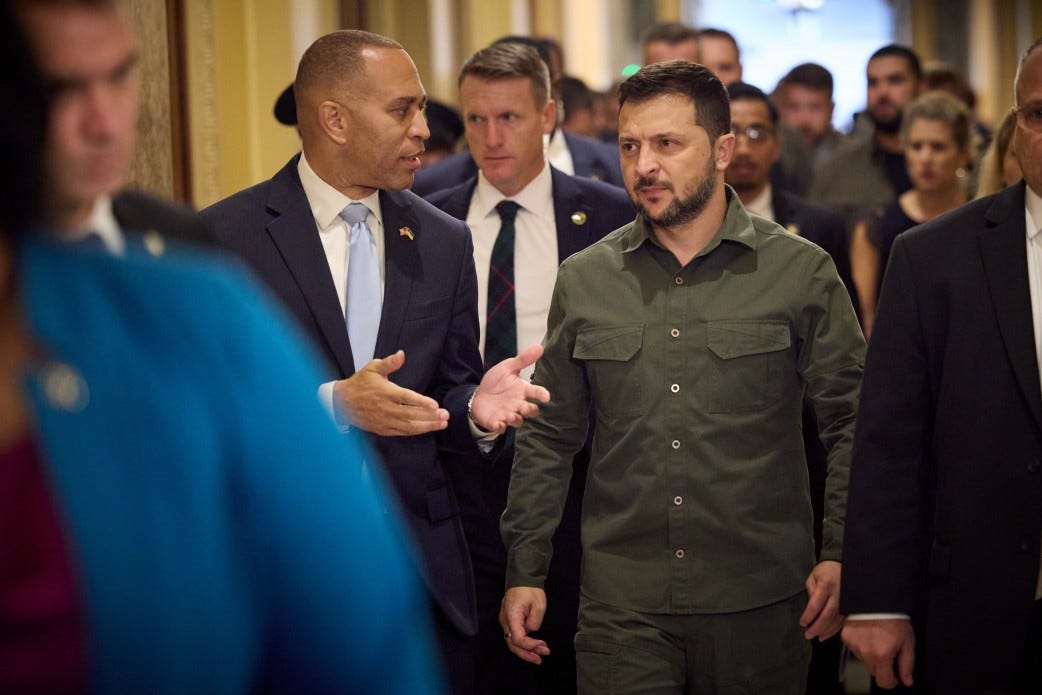Last week, the U.S. House of Representatives voted 3 to 1 – 311 to 117 to be exact – to continue to provide assistance to Ukraine. A few days later, House Speaker Kevin McCarthy caved to a minority in his party and removed aid for Ukraine from the Continuing Resolution (CR) to keep the government funded. Russian state media rejoiced. And Putin confirmed his theory about us. All along, Putin has planned to play the long game, believing that the West, the U.S. in particular, would eventually lose interest in Ukraine, in turn allowing him to gain full control of the four Ukrainian regions he annexed on paper last year. Waiting us out has been Putin’s strategy from the start.
Elected American officials who care about U.S. national security interests must reverse this decision as soon as possible. In the spirit of representative democracy, House Speaker Kevin McCarthy must allow the U.S. House of Representatives to vote again on this matter. If he does, aid packages for Ukraine will pass again overwhelmingly. Most members of Congress understand the high stakes at play in staying the course on assistance to Ukraine. Pulling the plug on assistance now would be morally wrong, antithetical to the U.S. national security interests, and counterintuitive to our democratic ideals.

The moral argument for supporting Ukraine is obvious. This invasion was completely unprovoked, illegal, and unnecessary. Ukraine did not threaten Russia. The intellectual contortions that some analysts ask us to do to understand this invasion as a “preventive war” defies logic. NATO did not provoke this war. (For the details, read here.) Putin’s method of fighting – bombing civilians, raping women and girls, kidnapping children, and destroying Ukrainian cultural heritage sites – is also barbaric. He and his agents have rightly been accused of committing war crimes and crimes against humanity. This war is also one between a dictatorship and a democracy. Unlike some other wars, those who cherish democratic values have a clear side in this conflict.
Cutting military support also will lead to more Ukrainian lives lost. That is immoral too. Ukrainians have a deep commitment to repel their invaders – a sentiment I heard clearly and repeatedly during my trip to Kyiv last month. (Read my trip report here.) They have lost too many loved ones to capitulate to Putin now. They will not stop fighting, even if we stop military support. Those who do not believe this, have not talked to many Ukrainians. Our withdrawal of military assistance will not end the war but only prolong it, leading to more Ukrainian deaths.
But even if Members of Congress or their constituents do not care about morality in international politics or ethics in U.S. foreign policy – because after all, it is a brutish and nasty world out there – there are many realpolitik arguments for continued aid to Ukraine. Real realists understand that U.S. military assistance to Ukraine directly serves our own national security interests.
First, Putin’s Russia threatens our NATO allies’ security in Europe. By fighting, the Ukrainian Armed Forces are weakening the Russian military threat every day. Ukrainians are fighting the Russian invaders today so that Poles, Estonians, and Americans do not have to do so tomorrow. This cold-hearted realism does not offend Ukrainians. In Kyiv, I heard many senior Ukrainian officials say that they understand that their warriors are doing the dirty work for us. And all they ask for is more and better weapons. Not our soldiers; just our ammunition.

Second, some Republican elected officials argue that we need to focus on the China threat, not the Russia threat. This is a false dichotomy. Putin’s defeat in Ukraine will compel Xi Jinping to think harder about invading Taiwan. Putin’s victory in Ukraine will embolden Xi. Our withdrawal from Ukraine will confirm Xi’s assessment of the U.S. as an isolationist, weak, and declining power unprepared to deter an invasion of Taiwan. That is exactly the wrong message to be sending to Beijing right now. (Top officials in Taiwan echoed this sentiment when I visited last year. Read about that trip here.)
Third, after World War II, imperialism and annexation rightfully became taboos. If we allow Putin to annex and control Ukrainian territory through military conquest, we will be opening a Pandora’s box of anarchy. This could not be further away from serving U.S. security interests. If annexation and imperialism return as standard practices in international affairs, the U.S. will constantly be pulled into wars and conflicts like we were before 1945.
In approving new assistance to Ukraine, U.S. Congress could also compel other actions to reduce the economic burden on the U.S. taxpayer to finance our assistance to Ukraine.
For instance, Speaker Kevin McCarthy could add an amendment to new legislation that would require the Biden administration to transfer Russian assets frozen in American banks to an internationally-managed fund for Ukraine. (Read the details of how to do so here.) It is illogical to ask the American taxpayer to pay for reconstruction without using these Russian funds as reparations first. The Russian assets frozen in the United States are a small fraction of those funds being held in European banks, but our leadership will make it easier for Europeans to follow suit. Congress could work with the Biden administration to explore more creative ideas about lending military hardware to Ukraine, rather than gifting. (Over a year ago, Biden signed into law the “Ukraine Democracy Defense Lend-Lease Act of 2022.”) The new legislation could also call for the European countries to devote a certain percentage of their defense budget to Ukraine, although many Members might be surprised to learn that this burden-sharing is already happening – a real success of Biden's diplomacy and European leadership. What Congress cannot do is pull the plug on assistance. That would be both immoral and not in our realpolitik interests.
After World War I, some Americans argued that wars in Asia, Africa, and Europe were not our problem. Japan’s invasion of China – not our problem. Italy’s invasion of Ethiopia – not our problem. Germany’s (and the Soviet Union’s) invasion of Poland and then other countries – not our problem. Back then, leaders of the America First Committee believed that we could stick our heads in the sand, and everything would be fine. That strategy did not work out so well back then. It will not work out well today either.




Well put. Based on your suggestion here to transfer Russian assets frozen in US banks to an internationally managed fund for Ukraine, I take it the Biden Administration isn't even considering this yet? If not, why not? We seem to be at a point where new strategies to support Ukraine are needed ASAP, in both the US and EU.
If the current administration and Congress wants to fund the continuation of the Ukrainian war, they need to convince the American people. People in the US are wary of stated one-year wars that become twenty years wars. The time to scope a war is before you enter a war. The DC elites need to clearly explain the WHY, the HOW AND THE ENDING. Otherwise, it will be like Afghanistan well it was important to fighting China, the Taliban are gaining strength, lets country build and help these poor folks, and I am going to leave in the middle of the night.